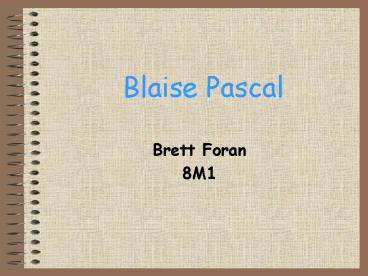Blaise Pascal - PowerPoint PPT Presentation
1 / 7
Title:
Blaise Pascal
Description:
... on June 19, 1623 in Clermont-Ferrand, Puy-de-D me, France and died on August 19, 1662 in Paris. ... Pascal's mother died when he was three and he was raised ... – PowerPoint PPT presentation
Number of Views:1909
Avg rating:3.0/5.0
Title: Blaise Pascal
1
Blaise Pascal
- Brett Foran
- 8M1
2
Pascals Life
Blaise Pascal was born on June 19, 1623 in
Clermont-Ferrand, Puy-de-Dôme, France and died on
August 19, 1662 in Paris. Pascals mother died
when he was three and he was raised and educated
by his mathematician father Etienne. Described as
a young mathematical genius Pascal, by age 16,
had researched and written on the subject of
projective geometry and the the theory of
probabilities. In 1964 Pascal abandoned maths
for religion and wrote a lot of religious books
around this time. Pascal died of abdominal
problems and his last words were may God never
abandon me. He was buried in the cemetery of
Saint-Etienne-Du-Mont. In honour of Pascal, his
name has been given to a unit of pressure, to a
computing language and to Pascals wager and
Pascals triangle.
3
Pascals Inventions, Theories and Studies
- Calculator A basic machine for adding and
subtracting - Pascals Wager A theory on probabilities and an
argument for the belief of God - Pascals Triangle A mathematical pattern
- Hydraulic press Invented the hydraulic press
using fluid pressure to multiply force - Barometer Identified that the level of mercury
in a barometer is determined by the increase
or decrease of atmospheric pressure - Vacuum Pressure Extensive research into the
weight and density of air
4
Pascals Triangle
- A geometric arrangement of binomial coefficients
in a triangular shape. - It is an important set of numbers in probability
and statistics and strongly influenced the
development of modern economics. - 1
- 1
- 1 2 1
- 3 3 1
- 1 4 6 4 1
- 1 5 10 10 5 1
- 6 15 20 15 6 1
- 1 7 21 35 35 21 7 1
5
Pascals Calculator
- The first mechanical calculator was invented by
Blaise Pascal. - It was for assisting his fathers workload as a
tax commissioner. - He began work on his first calculator in 1642, at
the age of 19 and over the next ten years
produced fifty prototypes but only sold about a
dozen machines. - They could only be used for adding and
subtracting. - The Pascaline (1645) was a decimal machine which
was not effective in the French currency system. - It is the basis for todays calculators and
computer historians recognise his contribution to
their field.
6
Hydraulic Press
- In 1653 Pascal undertook several experiments on
the pressure exerted by gases and liquids
(barometer, hydraulic press and the syringe). - The hydraulic press depends on Pascals
principle the pressure through a closed system
is constant and equal in all directions. - The hydraulic press is used today in a range of
industries e.g car jack where the simple pumping
action of a person and the mechanical advantage
gained through the hydraulic press can lift the
weight of a car. - If we combine a hydraulic press and a calculator
i.e physical science and mathematics we can
achieve the measurement of mass, this is the
basis of a set of industrial scales.
7
Bibliography
- http//en.wikipedia.org/wiki/BlaisePascal
- http//en.wikipedia.org/wiki/Pascal27scalculator
- http//en.wikipedia.org/wiki/Pascal27striangle
- http//www.ebroadcast.com.au/lookup/encyclopedia/b
l/ Blaise_Pascal - http//www.es.flinders.edu.au/mattom/sciencesoci
ety/ lectures/lecture20/pascal - http//www.ideafinder.com/history/inventors/pascal

